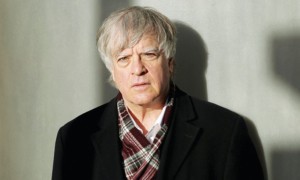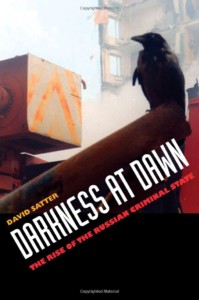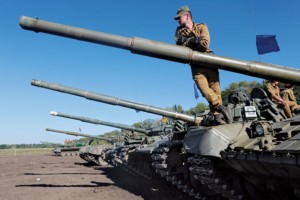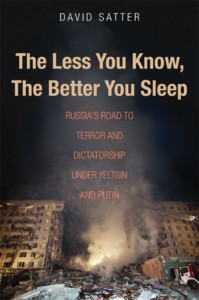Editor’s Note: The following interview is part of the journalism produced by MYMEDIA, a Kyiv Post partner. MYMEDIA is a program aiming at development of independent media and professional capacity building for journalists in Ukraine, Belarus, Turkey, Azerbaijan, Armenia, Georgia and Moldova. The program is financially supported by the Danish government. It is implemented by NIRAS, a leading international consultancy company, and BBC Media Action.
American journalist David Satter in late September gave a speech at the Publishers’ Forum in Lviv, presenting his new book “The Less You Know, The Better You Sleep: Russia’s Road to Terror and Dictatorship Under Yeltsin and Putin” (Yale University Press, 2016). Satter has been writing about Russia for 40 years. He has been a correspondent for the Financial Times and The Wall Street Journal in Moscow and worked under KGB surveillance during the Cold War. Satter authored four books on the Soviet Union and Russia. First he criticized the Soviet regime, then Boris Yeltsin’s, and after that – Vladimir Putin’s Russia. His writings highlighted violations of human rights in the Soviet Union. Later he investigated crimes of Russian special services, for which he was expelled from the country several times. MYMEDIA talked to Satter about Russian propaganda: how its strategy differs in the United States, Europe and Ukraine, and whether the governments in these regions react adequately to Putin’s disinformation.

David Satter
MYMEDIA: What motivated you to take up the topic of Russia?
Satter: I am the product of the Cold War. I was born in Chicago at the time, when the confrontation between the Soviet Union and the West was the main topic of discussion. Apart from that, at the school where I was studying there was an option to study Russian. It was completely accidental – an immigrant from the Soviet Union was teaching Russian there…I followed my father’s advice to study Russian. At that time only a limited circle of people – diplomats and correspondents – had an opportunity to visit the Soviet Union. I could not imagine then that one day I would be one of them…Afterwards, I became a post-graduate student at Oxford University, and it brought me closer to the Soviet Union. And suddenly I got a chance to go to the USSR.
MYMEDIA: Working in Soviet Union and Russia as a foreign correspondent is difficult. You were expelled several times. What drives you forward and what could kill your interset?
Satter: I was driven by my interest, and it is probably too late to have it killed. Russia is a very interesting country, despite all its problems. Russian journalists often ask me if I love Russia. I answer this question with a question, “Do you love your wife?” And he says: “Of course.” So do I. I have lived with “her” for many years and I know all her vices. It is already hard to imagine my life without her.
MYMEDIA: Considering your experience in observing Russian behavior, were the events of 2014 – Russian reaction to the EuroMaidan Revolution, annexation of Crimea and inciting war in eastern Ukraine – predictable to you?
Satter: One could foresee it. Maidan was a direct threat to the system of power in Russia. Putin and the group surrounding him controlled all the levers of power in Ukraine, and substituting them was not easy…There was no way that the Russian authorities wanted to let that happen.
MYMEDIA: So you already were assuming that Russia would annex Crimea and unleash the war in Donbas?
Satter: The last thing Russian authorities wanted was for the Russian people to see what was happening in Ukraine: that Ukraine was creating a prosperous democratic state. There was a risk that Putin’s control would be threatened. People are not stupid after all. They will see that the main obstacle to an improvement of their lives is the criminal regime. And they would see then how it could be eliminated. When a million people take to the streets, it is not so easy to attack them. This is why Maidan was a very undesirable precedent from a Russian viewpoint. As for the annexation of Crimea and the invasion of eastern Ukraine, it was just a red herring. Putin wanted to divert people’s attention from the important lessons that they could learn from the Ukrainian EuroMaidan, and to that extent, he incited a wave of chauvinistic emotions inside Russia.

David Satter wrote “Darkness At Dawn: The Rise of the Russian Criminal State.”
MYMEDIA: As for Russian propaganda – to what extent is this topic on the American agenda?
Satter: The situation in the USA is special now because we are in the middle of a presidential race, and all the attention is currently focused on that. Everybody wants to predict who will win. Clarity concerning the Ukrainian issue will only come later, because everything can change. I was an advisor to John Kasich [a Republican Party candidate for president.] We supported supplying weapons to Ukraine in order to resist the Russian aggression. If the enemy is well-armed, the desire to attack him will decline automatically.
MYMEDIA: Don’t you think it might lead to another Syria in Ukraine?
Satter: We are not talking about weapons for attack, only about weapons for defense. They can only be used defensively against tanks or artillery, for the sake of creating equal conditions. But of course there is a risk in each decision. The idea is to prevent the resumption of military actions.
MYMEDIA: Or, on the contrary, to provoke it?
Satter: There was no provocation for the Russian invasion in Ukraine. Nowadays, [Kremlin-backed separatists] have more tanks than many NATO members. The large flow of Russian weapons crossing the border and the quantity of “volunteers,”; it is organized by Russia. All of this took place without any provocation. But of course the possibility of escalation cannot be excluded. If Russia sees that Ukraine has decent defense weapons, it can react with air attacks. But this might also lead to retaliatory measures – the strengthening of the sanctions. Now we are freely trading gas and oil. But without it, Russia would be totally bankrupt. These are hard choices which are always accompanied by risks. We are dealing with people. And often these people are not very stable. It is difficult to predict how they will react. But there are reasons to believe that the stronger the Ukrainian defense is, the less the desire to attack Ukraine.
MYMEDIA: But with Putin it doesn’t seem to be so easy?
Satter: At the worst, if there were a resumption of war, Ukrainians with weapons would be able to defend themselves better.

Pro-Russian T72 tank crews rest as they take part in military exersices at the “Torez” firing ground near the small town of Shakhtarsk in the Donetsk region on September 16, 2016. (AFP)
MYMEDIA: What does the Russian strategy in the United States look like?
Satter: The main goal of the Russian regime in general is the preservation of power, property, wealth and lawlessness. Being bandits, they cannot freely join international organizations. They cannot follow Western rules. They formally want to be members of various international and European organisations, but their inner corruption contradicts this aspiration. America, as the preacher of human rights and the defender of democracy is their objective enemy. The Russian authorities need external enemies because they need to divert the attention of the population away from their own crimes.
This is why I think their strategy is to undermine constantly American politics, wherever possible. But I do not think it is some global plan, like at the time of the USSR, when they wanted to spread communism to the entire world.
MYMEDIA: Many people in Ukraine, including President Petro Poroshenko, believe that the West is losing the information war. Do you agree?
Satter: The fact is that we are not getting across our points of view in the best manner, whereas Russian propaganda is very aggressive and well-done. Russian propaganda is directed at all the people from the post-Soviet space, including Ukraine. It is rather a question of professionalism: We often present our information in an unskilful, unprofessional manner. The internal situation in the West is worrying, but this has been the situation before, over the course of history. The most important is that the culture of these societies is democratic. And the first thing Ukraine can learn from the West is the rule of law. It is a little weird that when Poroshenko talks about “losing control of Western values” – and at the same time, he himself is doing very little to establish the rule of law in his own country. One needs to have an efficient system of law to fight corruption: fair courts, police and prosecutors. Therefore I don’t know what he is talking about. He has to start with himself.
MYMEDIA: What do you see as the options for fighting disinformation? Ukraine, for example, banned Russian TV channels. Some Russian TV series were also banned.
Satter: This is a difficult question. Of course, it’s better not to ban – but to improve the quality of your own broadcasting and truthful information.
MYMEDIA: There is also a financial question – how much money is Russia spending for its disinformation campaign? How does this compare to how much the media in democratic countries can afford to spend, especially in Ukraine.
Satter: If a TV channel is regularly lying and distorting, there should be means for the prosecutor to sue that media outlet and potentially block it. But this should be done very carefully, because basically it is not right. However, in the situation when propaganda can cost the lives of people, this question should be discussed. It is also important to evaluate how effectively this propaganda works and how much influence it has. It might turn out to be much less effective than we think it is. Prohibiting Russian channels is appropriate in Ukraine in the framework of military censorship against the undermining effect of that propaganda.

David Satter also wrote “The Less You Know, The Better You Sleep.”
MYMEDIA: New projects were born in response to Russian propaganda, such as Current Time, which is offering quality information for a Russian-speaking audience, and Stop Fake that exposes false reporting. Are there enough of these kinds of projects, and how effective are they against Russian disinformation?
Satter: There should be more of them.
MYMEDIA: So objective information, common sense and democracy are in the end stronger than disinformation?
Satter: Normally yes. But in Russia no one can compete with state TV. They seized it and are using it. In Ukraine there are different sources or information, and this is the most important thing. This is why, if the representatives of fair information are able to present their version of events in a competent way, they will win.
MYMEDIA: How do you estimate the perspectives of the development of the Ukrainian-Russian-American relations in the case of a Hillary Clinton victory or a Trump victory?
Satter: I don’t know what will happen, but most certainly the difference will not be dramatic. Trump will have an adviser who is smarter than he is, and Clinton has already committed a lot of foolish mistakes. Now Trump is just talking nonsense, often saying extremely stupid things. But he does not have access to intelligence information. He has to find advisers among the Republicans who will be more realistic.
Yana Biliaieva is a journalist with ith MYMEDIA, covering media and political matters.
